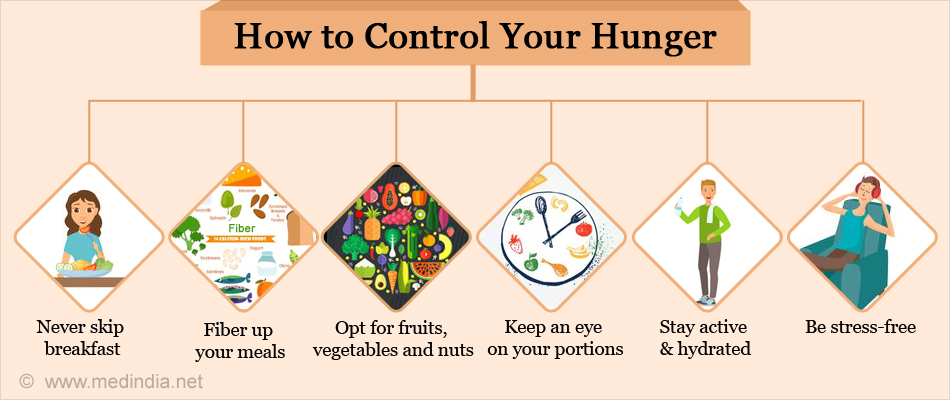- What is Hunger - (http://www.bread.org/what-hunger)
- Hands-on ways to beat hunger - (http://food.caritas.org/hands-on-ways-to-beat-hunger/)
- Appetite - Increased - (https://medlineplus.gov/ency/article/003134.htm)
- Bulimia Nervosa - (https://www.helpguide.org/articles/eating-disorders/bulimia-nervosa.htm)
What is Hunger?
Hunger can be defined as a compelling necessity for food accompanied by contraction and churning movement of the empty stomach. Human beings are born with an innate craving that is defined as hunger, but hunger can be physiological or psychological.
Excessive hunger is defined as a craving for food rather than the calorie requirements of the body. Normally, our appetite increases as a result of extensive exercise, or strenuous activity, but several factors like stress and depression can also lead to increase in hunger. If you are experiencing a gradual increase in your food intake, it can be an indication of a health disorder.
Reasons Behind Excessive Hunger
An increase in appetite is medically termed as polyphagia or hyperphagia. The following condition may cause excessive hunger.
I. Endocrinological conditions
- Bulimia nervosa is an eating disorder where one tends to overeat out of compulsion. It is a serious eating disorder affecting men and women of all ages.
- Diabetes mellitus including gestational diabetes contributes to excessive hunger.
- Graves’s disease is an autoimmune disorder that leads to overactivity of the thyroid gland causing polyphagia.
- Hyperthyroidism is the excessive production of the thyroid hormone.
- Hypoglycemia is a condition where the blood sugar level decreases below 4 mmol/l and leads to an increase in appetite.
- Hyperglycemia is a state where the blood sugar level rises abnormally high. The glucose (sugar) present in the blood is not able to enter the cells due to a lack of insulin. Hence, the food cannot be converted into energy. The lack of energy in the body creates a desire to eat more food.
II. Psychiatric Conditions
- Stress
- Depression
Mental stress and depression lead to mood disorders. Many people tend to overeat or eat even when there is no sensation of hunger when they feel lonely, bored, or sad.
III. Other Conditions
- Premenstrual syndrome - hormonal changes can have multiple effects, one of them being excessive hunger pangs.
- Drugs such as corticosteroids or antidepressants lead to a craving for food.

Ways to Deal with Excessive Hunger
Hunger control and developing a balanced appetite are of utmost importance. You can scale down food cravings in the following ways:
Don’t skip breakfast - Breakfast plays a vital role in regulating our eating habits. Research shows that skipping breakfast makes one extremely hungry by mid-day and the person ends up eating more than required. Moreover, people who skip breakfast are more prone to mid-meal snacking, and the food options are generally unhealthy.
Have a complete diet - Although this may sound contrary to the goal, ensure that the daily diet is rich in macronutrients like fats, carbohydrates, proteins and micronutrients like minerals, and vitamins that are essential for the body. Eating slow, having small but frequent meals and not gulping down morsels are good habits.
Count on fruits and vegetables - Fruits with high water content and fiber-rich fruits and vegetables have higher satiety value. Fresh fruits such as apple, kiwi, orange, pear, and watermelon will give you the required calories, and fiber-rich vegetables such as spinach will keep you full for a longer duration.
Munch on nuts- Hormonal imbalances occurring due to hyperthyroidism, hyperglycemia, or premenstrual syndrome guide our brain in a way that it craves food. Vitamin E, vitamin B, magnesium, iron, and selenium are needed to maintain normal hormone levels.
- Almonds are rich in calcium, fiber and vitamin E
- Cashews are loaded in iron
- Walnuts are packed with omega-3 fatty acids
- Peanuts are packed with fiber and protein
Keep a small box of nuts handy. Have nuts in between meals. This will keep you away from hunger pangs and also provide essential nutrients.
Drink ample amount of fluids- Trick your brain by drinking fluids all day. Drinking 2-3 liters of fluids a day, including water and other healthy beverages, is a must. It provides a feeling of satiety without actually having to take in calories. Drinking water before meals helps to curb hunger.
Mind your portions- Another trick that works for many is taking smaller portions. The change can be made gradually. Using small size plates and bowls, thin glasses, and eating with people can help achieve this goal.
Reduce sugar intake- We unknowingly consume a lot of sugar in the form of teas and soda. Cutting down a cup of tea daily and avoiding aerated drinks can go a long way. It is needless to say that sugary foods like candies, chocolates and ice creams should be banned from your diet. Switching to sugar-free chewing gums and sweets and having them in moderate quantities just to satisfy the sweet tooth is a good option.
Fiber-rich diet- Fiber-rich foods have been shown to have a higher satiety value. Thus, you end up eating less and still feel full. Include oatmeal, nuts, beans, apple, berries, lentils, brown rice, carrots, cucumber, and tomatoes in your diet.
Stay active- Opting for physical activity will help keep your mind off the unnecessary craving for food. Additionally, it will also help you burn the unwanted calories that you have accumulated by excessive eating.
Counter emotional stress- Stress is a comparative term and is different for everyone. The trigger can range from heavy traffic to family pressure. As many tend to binge eat when sad or stressed, learning to cope with the pressure can also alter your food habits.

Health Tips
- It is important to give your plate undivided attention and keep away distractions like television and mobile phones. Catching up with friends is good but not while you are eating.
- Medication helps you have better control of yourself, thus, helping you to control food cravings. There are several yoga poses that improve digestion, which can be practiced on a regular basis.
- Some herbal remedies are believed to be useful in suppressing hunger such as seeds of Achyranthes aspera, also known prickly chaff.
- Consult your physician if medicines are causing weight gain or excessive hunger. Your doctor might reduce the dose or prescribe an alternative. Do not abruptly stop taking the medications without consulting your doctor.






